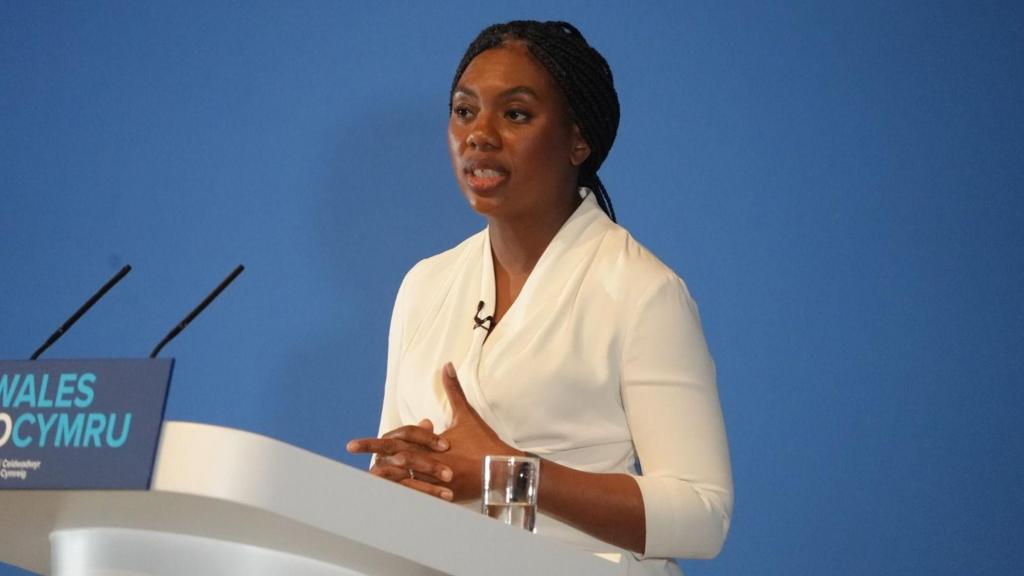UK Conservative leader Kemi Badenoch and Welsh Conservative leader Darren Millar have left open the possibility of post-election coalitions with Plaid Cymru and Reform UK following next year’s Welsh elections.
Current projections suggest a minority government is highly likely, necessitating inter-party cooperation.
Speaking at the party’s Welsh conference in Llangollen, Millar stated a willingness to collaborate with “anyone” to oust the Labour government.
Badenoch, who previously ruled out working with Reform UK at a UK level, acknowledged the potential for post-election negotiations but dismissed the topic as a “distraction.”
The Conservatives, currently polling fourth behind Labour, Reform UK, and Plaid Cymru, face an uphill battle after losing all their Welsh MPs in the last general election.
Millar characterized his party, holding 16 seats in the Senedd, as a “government in waiting,” while Badenoch urged members to actively oppose Plaid Cymru and Reform UK.
While Labour is unlikely to partner with the Conservatives or Reform UK, Plaid Cymru has ruled out collaboration with Reform UK but remains open to working with Labour or the Conservatives.
Deals with either Plaid Cymru or Reform UK would likely prove controversial within the Conservative Party, particularly given Plaid Cymru’s pro-independence stance.
On BBC Radio Wales Breakfast, Millar declared: “I’m prepared to work with anybody to get rid of this failing Labour government.”
Pressed on potential collaboration with Reform UK, he reiterated his willingness to work with “anyone” to remove the Labour government.
Similarly, he offered the same response when questioned about a potential coalition with Plaid Cymru.
In an interview with BBC Wales, Badenoch was asked about the prospect of forming coalitions with Plaid Cymru or Reform UK.
She responded: “We’re not here to talk about deals, we’re here to talk about what we are going to do to fix Wales.”
“When politicians prioritize discussions about deals and power-sharing, they demonstrate a lack of focus on the needs of the people.”
“Therefore, Darren and I are fully committed to the Conservatives winning as many seats as possible.”
While acknowledging the possibility of post-election talks with Reform UK or Plaid Cymru, Badenoch labeled such discussions a “distraction.”
Reform UK leader Nigel Farage has expressed openness to working with any party to form a Welsh government.
In her conference speech, Badenoch accused Plaid Cymru and Reform UK of employing “identity politics.”
She criticized Labour for deflecting blame and asserted that Plaid Cymru and Reform UK benefit from Labour’s current Westminster power.
“They engage in identity politics, and we must counter this. Reform is not the answer, Labour is not the answer.
“These parties are essentially the same; they pander to voters to advance their own interests.”
Badenoch described last year’s election results as “devastating” and cited English local election results as evidence the party’s challenges persist.
She declared Wales as “where our fightback begins”.
In her speech, she mistakenly referred to Welsh politicians as “MSPs” before correcting herself, calling it a “slip of the tongue.”
Millar acknowledged the “bruising” defeat in last year’s general election and the need to rebuild trust.
He positioned the Conservatives as “the only credible alternative” to the Labour government, emphasizing the party’s commitment to freedom, choice, and personal responsibility.
The party unveiled several policy proposals, including a pledge to reduce NHS treatment wait times to a maximum of one year and the reinstatement of home economics in schools.
Millar highlighted these policies as evidence of the party’s readiness to govern.
The conference follows internal disputes regarding candidate selection, with concerns raised about the exclusion of members opposed to devolution.
By Gareth Lewis, BBC Wales political editor
While Badenoch avoided explicitly discussing post-election deals, she didn’t rule them out either.
Both she and Millar appear to recognize that, given the unfavorable poll numbers, coalition-building presents the Conservatives’ best chance of participating in government.
However, unlike Millar’s more open approach, Badenoch’s reluctance suggests an awareness of the potential downsides, particularly regarding the wider party ramifications.
Her previous rejection of a pact with Reform UK at the Westminster level highlights their potential threat, and a deal with Plaid Cymru could face significant internal opposition.
Her language is also noteworthy: while Senedd politicians view such deals as commonplace, Westminster politicians often perceive them as “backroom deals”.
BBC News spoke to young party members at the Welsh Conservative conference in Denbighshire.
They pledged to reduce treatment wait times to a maximum of one year if elected next May.
Millar acknowledged public frustration with devolution.
First Minister Mark Drakeford stated the new law will enhance the Welsh language’s role in education.
The Reform UK leader indicated he has no long-term plan to lead the party in Wales.

